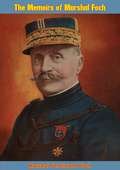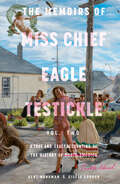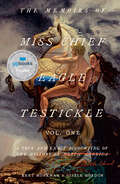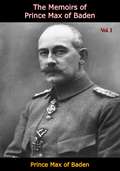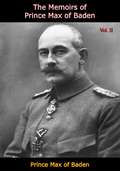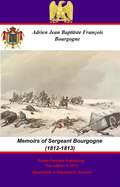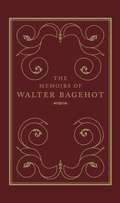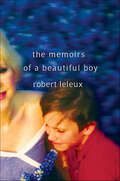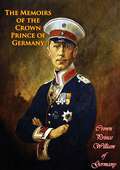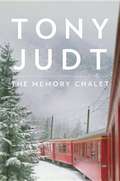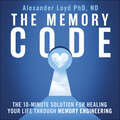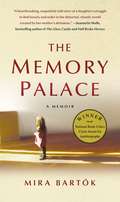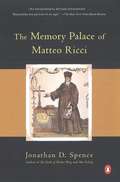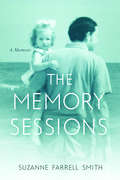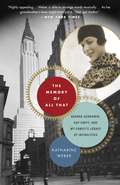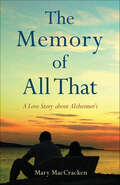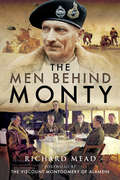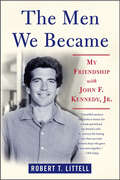- Table View
- List View
The Memoirs of Marie Antoinette, Volume 5
by Madam CampanMemoirs of the court of Marie Antoinette, Queen of France
The Memoirs of Marshal Foch
by Marshal Ferdinand FochThe Commander-in-Chief of the Allied armies, the great strategist who directed the final victory, declined to publish his memoirs during his lifetime. Upon his death, his family at first intended to withhold his manuscript for ten or fifteen years, but the advice of the Marshal’s friends prevailed.So this, the final word on the winning of the great war, was released in 1931, just two years after Marshal Foch’s death.At first the Marshal planned to write a complete history, but he had neither the time nor the strength to complete so large a work. And it is fortunate for posterity that he did not. Others can collect and collate official documents. We have here what Foch alone could have written, his personal story of the war based solely upon his own experience.And it becomes apparent that Foch was not only the great commander and the leading strategist of his time but a writer with a sense of style and a graphic use of words that make his record one of the most moving and dramatic accounts of the great war.On certain details Foch’s views may be questioned, but his story of the victory may well be called the final word. Only the leader of ten million men can speak from the vantage of supreme command.Special maps prepared by the French War Office, unpublished photographs, and facsimiles of the Armistice are included.
The Memoirs of Miss Chief Eagle Testickle: A True and Exact Accounting of the History of Turtle Island
by Kent Monkman Gisèle GordonFrom global art superstar Kent Monkman and his longtime collaborator Gisèle Gordon, a transformational work of true stories and imagined history that will remake readers' understanding of the land called North America.For decades, the singular and provocative paintings by Cree artist Kent Monkman have featured a recurring character—an alter ego of sorts, a shape-shifting, time-travelling elemental being named Miss Chief Eagle Testickle. Though we have glimpsed her across the years, and on countless canvases, it is finally time to hear her story, in her own words. And, in doing so, to hear the whole history of Turtle Island anew. The Memoirs of Miss Chief Eagle Testickle: A True and Exact Accounting of the History of Turtle Island is a genre-demolishing work of genius, the imagined history of a legendary figure through which a profound truths emerge—a deeply Cree and gloriously queer understanding of our shared world, its past, its present, and its possibilities.Volume Two, which takes us from the moment of confederation to the present day, is a heartbreaking and intimate examination of the tragedies of the nineteenth and twentieth century. Zeroing in on the story of one family told across generations, Miss Chief bears witness to the genocidal forces and structures that dispossessed and attempted to erase Indigenous peoples. Featuring many figures pulled from history as well as new individuals created for this story, Volume Two explores the legacy of colonial violence in the children&’s work camps (called residential schools by some), the Sixties Scoop, and the urban disconnection of contemporary life. Ultimately, it is a story of resilience and reconnection, and charts the beginnings of an Indigenous future that is deeply rooted in an experience of Indigenous history—a perspective Miss Chief, a millennia-old legendary being, can offer like none other. Blending history, fiction, and memoir in bold new ways, The Memoirs of Miss Chief Eagle Testickle are unlike anything published before. And in their power to reshape our shared understanding, they promise to change the way we see everything that lies ahead.
The Memoirs of Miss Chief Eagle Testickle: A True and Exact Accounting of the History of Turtle Island
by Kent Monkman Gisèle GordonINSTANT NATIONAL BESTSELLERFrom global art superstar Kent Monkman and his long-time collaborator Gisèle Gordon, a transformational work of true stories and imagined history that will remake readers&’ understanding of the land called North America.For decades, the singular and provocative paintings by Cree artist Kent Monkman have featured a recurring character—an alter ego of sorts, a shape-shifting, time-travelling elemental being named Miss Chief Eagle Testickle. Though we have glimpsed her across the years in films and on countless canvases, it is finally time to hear her story, in her own words. And, in doing so, to hear the whole history of Turtle Island anew. The Memoirs of Miss Chief Eagle Testickle: A True and Exact Accounting of the History of Turtle Island is a genre-demolishing work of genius, the imagined history of a legendary figure through which profound truths emerge—a deeply Cree and gloriously queer understanding of our shared world, its past, its present, and its possibilities.Volume One, which covers the period from the creation of the universe to the confederation of Canada, follows Miss Chief as she moves through time, from a complex lived experience of Cree cosmology to the arrival of European settlers, many of whom will be familiar to students of history. An open-hearted being, she tries to live among those settlers, and guide them to a deeper understanding of the interconnectedness of all beings and the world itself. As their numbers grow, though, so does conflict, and Miss Chief begins to understand that the challenges posed by the hordes of newly arrived Europeans will mean ever greater danger for her, her people, and, by extension, all of the world she cherishes.Blending history, fiction, and memoir in bold new ways, The Memoirs of Miss Chief Eagle Testickle are unlike anything published before. And in their power to reshape our shared understanding, they promise to change the way we see everything that lies ahead.
The Memoirs of Prince Max of Baden Vol. I (The Memoirs of Prince Max of Baden #1)
by Prince Max of Baden Baden W. M. CalderThis is Volume I of II comprising the authorized translation of Prince Max of Baden’s German memoirs published in 1927 (original German title: Erinnerungen und Dokumente). This translation was first published in 1928.“NOT long after the Revolution, when it became clear that an essential share of the blame for the German collapse would be ascribed to me, I decided to give a public account of my stewardship. I soon realized that I could only explain the actual connection of events both to the German people and to myself if I submitted the charges made against me to a careful examination, and also made up my mind to understand the point of view of my opponents.“As early as 1919 I found myself compelled to define my attitude to the disputed happenings of 9th November. I did this in a publication which was printed in all the newspapers but was virtually hushed up in the controversial literature.“In the study and self questioning of eight years I think I have got as near the truth as I can.“In the course of my work my apologia has grown into something different—an account based on original sources of that fateful epoch of the history of Germany in which I was involved. I put my trust in the weight of the facts.” (Prince Max of Baden)
The Memoirs of Prince Max of Baden Vol. II (The Memoirs of Prince Max of Baden #2)
by Prince Max of Baden Baden W. M. CalderThis is Volume II of II comprising the authorized translation of Prince Max of Baden’s German memoirs published in 1927 (original German title: Erinnerungen und Dokumente). This translation was first published in 1928.“NOT long after the Revolution, when it became clear that an essential share of the blame for the German collapse would be ascribed to me, I decided to give a public account of my stewardship. I soon realized that I could only explain the actual connection of events both to the German people and to myself if I submitted the charges made against me to a careful examination, and also made up my mind to understand the point of view of my opponents.“As early as 1919 I found myself compelled to define my attitude to the disputed happenings of 9th November. I did this in a publication which was printed in all the newspapers but was virtually hushed up in the controversial literature.“In the study and self questioning of eight years I think I have got as near the truth as I can.“In the course of my work my apologia has grown into something different—an account based on original sources of that fateful epoch of the history of Germany in which I was involved. I put my trust in the weight of the facts.” (Prince Max of Baden)
The Memoirs of Sergeant Bourgogne (1812-1813)
by Anon Pickle Partners Publishing Sergeant Adrien Jean Baptiste François BourgogneThis ebook is purpose built and is proof-read and re-type set from the original to provide an outstanding experience of reflowing text for an ebook reader. Considered by the majority of commentators to be the quintessential personal narrative of Napoleon's disastrous 1812 campaign in Russia. The book charts the progress of the Grande Armée toward it's apogee at the occupation of Moscow, followed by the great fire of Moscow and the looting of the city to the terrible retreat. During the retreat the full horror of the hunger, privation are vividly depicted, not only in Bourgogne's own sufferings, but also those of his friends and countrymen. He stumbles through trials that proved too much for most those around him, whilst maintaining a haunting ability to describe the torments that try him. This account written partly in captivity in 1813, after capture at the battle of Dessau in 1813 and partly from letters he sent to his family during 1812, its historical significance and value cannot be over stated. Text taken from book published in 1899 by William Heinemann, London
The Memoirs of Walter Bagehot
by Frank ProchaskaWalter Bagehot (1826-1877) was a prominent English journalist, banker, and man of letters. For many years he was editor of "The Economist," and to this day the magazine includes a weekly "Bagehot" column. His analyses of politics, economics, and public affairs were nothing short of brilliant. Sadly, he left no memoir. How, then, does this book bear the title, "The Memoirs of Walter Bagehot"? Frank Prochaska explains, "Given my longstanding interest in Bagehots life and times, I decided to compose a memoir on his behalf. " And so, in this imaginative reconstruction of the memoir Bagehot might have written, Prochaska assumes his subjects voice, draws on his extensive writings (Bagehots "Collected Works "fill 15 volumes), and scrupulously avoids what Bagehot considered that most unpardonable of faults--dullness. A faux autobiography allows for considerable license, but Prochaska remains true to Bagehots character and is accurate in his depiction of the times. The memoir immerses us in the spirit of the Victorian era and makes us wish to have known Walter Bagehot. He is, Prochaska observes, the Victorian with whom we would most want to have dinner.
The Memoirs of a Beautiful Boy
by Robert LeleuxIn the Dear John letter Daddy left for Mother and me, on a Saturday afternoon in early June 1996, on the inlaid Florentine table in the front entry of our house, which we found that night upon returning from a day spent in the crème-colored light of Neiman's, Daddy wrote that he was leaving us because Mother was crazy, and because she'd driven me crazy in a way that perfectly suited her own insanity.In a memoir studded with delicious lines and unforgettable set pieces, Robert Leleux describes his East Texas boyhood and coming of age under the tutelage of his eccentric, bewigged, flamboyant, and knowing mother.Left high and dry by Daddy and living on their in-laws' horse ranch in a white-pillared house they can't afford, Robert and Mother find themselves chronically low on cash. Soon they are forced into more modest quarters, and as a teenaged Robert watches with hilarity and horror, Mother begins a desperate regimen of makeovers, extreme plastic surgeries, and finally hairpiece epoxies---all calculated to secure a new, wealthy husband. Mother's strategy takes her, with Robert in tow, from the glamorous environs of the Neiman Marcus beauty salon to questionable surgery offices and finally to a storefront clinic on the wrong side of Houston. Meanwhile, Robert begins his own journey away from Mother and through the local theater's world of miscast hopefuls and thwarted ambitions---and into a romance that surprises absolutely no one but himself. Written with a warmth and a wicked sense of fun that lighten even the most awful circumstances, The Memoirs of a Beautiful Boy is a sparkling debut.
The Memoirs of the Crown Prince of Germany
by Crown Prince William of GermanyBecause of his foppish and dandified appearance, emphasised by the cigarette holder he always used, the Crown Prince was regarded by the British during the Great War as a figure of ridicule, known to them as Little Willy. He was born in Potsdam on 6 May 1882, the eldest of Kaiser, and his memoirs begin with his childhood and early years and the development of his relations with his father, a somewhat remote figure…When war came he was given command of the Fifth Army with General Schmidt von Knobelsdorf as his chief of staff, and it was his army that launched the Verdun offensive in February 1916. As you read on the more it becomes clear that he was, in fact, far from his caricature. He was well aware of the enormous prestige attached to his person as son of the All-Highest and he did not hesitate to make use of it, in the political and military scene. He played no small part in the downfall of the Chancellor, von Bethman Hollweg, in 1917. In the aftermath of Ludendorff’s resignation he urged the Kaiser not to appoint Groener in his place, a man he regarded as a defeatist whom he disliked and mistrusted. He also maintained that the German army was not defeated at the Marne; it was withdrawn by its leaders. The battle was lost because the High Command gave it up as lost. When Moltke’s emissary, Lt Col von Hentsch, doing his rounds of the Army commanders ordering them to fall back, arrived at Fifth Army HQ, the Crown Prince refused point blank to comply without a written authority, which Hentsch did not have. And even when von Moltke himself turned up, struggling to repress his tears and demanded the instant withdrawal of Fifth Army, Wilhelm, after a lengthy argument still refused to go until he was ready. Moltke, apparently, left in tears. The imagination boggles at the thought of Haig tearfully imploring Rawlinson to obey orders, and the latter standing there, arms folded and saying: ‘Shan’t!’-Print ed.
The Memory Chalet
by Tony JudtA New York Times Book Review Notable Book of the Year "It might be thought the height of poor taste to ascribe good fortune to a healthy man with a young family struck down at the age of sixty by an incurable degenerative disorder from which he must shortly die. But there is more than one sort of luck. To fall prey to a motor neuron disease is surely to have offended the Gods at some point, and there is nothing more to be said. But if you must suffer thus, better to have a well-stocked head. " -Tony Judt The Memory Chalet is a memoir unlike any you have ever read before. Each essay charts some experience or remembrance of the past through the sieve of Tony Judt's prodigious mind. His youthful love of a particular London bus route evolves into a reflection on public civility and interwar urban planning. Memories of the 1968 student riots of Paris meander through the divergent sex politics of Europe, before concluding that his generation "was a revolutionary generation, but missed the revolution. " A series of road trips across America lead not just to an appreciation of American history, but to an eventual acquisition of citizenship. Foods and trains and long-lost smells all compete for Judt's attention; but for us, he has forged his reflections into an elegant arc of analysis. All as simply and beautifully arranged as a Swiss chalet-a reassuring refuge deep in the mountains of memory.
The Memory Code: The 10-minute solution for healing your life through memory engineering
by Alex LoydEvery one of us is the product of our past experiences. Good or bad, everything we do is informed by our memories - or more accurately, what we take away from those memories. But what if you could go back and rewrite the lessons of the past? What if you could turn a road block into a springboard? What if you could change your behaviour by changing your memories?Maybe it sounds too futuristic to be real, but it's both real and possible. Our past doesn't have to dictate our future. Losing weight, ending addiction, improving relationships, improving careers - you can really change these behaviours by altering your memories. In his groundbreaking new book The Memory Code, bestselling author Dr. Alexander Loyd teaches you how, revealing techniques he's been developing for more than 16 years.When we have a negative experience, we develop coping mechanisms to avoid that experience in the future. That can lead to behaviours like overeating, substance abuse, or poor lifestyle choices. By turning negative memories into positive ones, we can change the behaviours at the root of our problems. This process, called memory re-engineering, involves teaching our brains to re-imagine and re-code certain memories that trigger negative associations and the avoidance and coping mechanisms we've developed to deal with them. It means teaching ourselves to rethink those internal images so that instead of producing fear, anxiety and other negative emotions, they produce love, peace and positive associations.(P) 2019 Hachette Audio
The Memory Palace
by Mira BartokIn the tradition of The Glass Castle, two sisters confront schizophrenia in this New York Times bestselling poignant memoir about family and mental illness. Through stunning prose and original art, The Memory Palace captures the love between mother and daughter, the complex meaning of truth, and one family&’s capacity for forgiveness.*A Washington Post Best Book of the Year * *The National Book Critics Circle Award Winner for Best Autobiography* &“People have abandoned their loved ones for much less than you&’ve been through,&” Mira Bartók is told at her mother&’s memorial service. It is a poignant observation about the relationship between Mira, her sister, and their mentally ill mother. Before she was struck with schizophrenia at the age of nineteen, beautiful piano protégé Norma Herr had been the most vibrant personality in the room. She loved her daughters and did her best to raise them well, but as her mental state deteriorated, Norma spoke less about Chopin and more about Nazis and her fear that her daughters would be kidnapped, murdered, or raped. When the girls left for college, the harassment escalated—Norma called them obsessively, appeared at their apartments or jobs, threatened to kill herself if they did not return home. After a traumatic encounter, Mira and her sister were left with no choice but to change their names and sever all contact with Norma in order to stay safe. But while Mira pursued her career as an artist—exploring the ancient romance of Florence, the eerie mysticism of northern Norway, and the raw desert of Israel—the haunting memories of her mother were never far away. Then one day, a debilitating car accident changes Mira&’s life forever. Struggling to recover from a traumatic brain injury, she was confronted with a need to recontextualize her life—she had to relearn how to paint, read, and interact with the outside world. In her search for a way back to her lost self, Mira reached out to the homeless shelter where she believed her mother was living and discovered that Norma was dying. Mira and her sister traveled to Cleveland, where they shared an extraordinary reconciliation with their mother that none of them had thought possible. At the hospital, Mira discovered a set of keys that opened a storage unit Norma had been keeping for seventeen years. Filled with family photos, childhood toys, and ephemera from Norma&’s life, the storage unit brought back a flood of previous memories that Mira had thought were lost to her forever. The Memory Palace is a breathtaking literary memoir about the complex meaning of love, truth, and the capacity for forgiveness among family. Through stunning prose and original art created by the author in tandem with the text, The Memory Palace explores the connections between mother and daughter that cannot be broken no matter how much exists—or is lost—between them.
The Memory Palace of Matteo Ricci
by Jonathan D. SpenceIn 1577, the Jesuit Priest Matteo Ricci set out from Italy to bring Christian faith and Western thought to Ming dynasty China. To capture the complex emotional and religious drama of Ricci's extraordinary life, Jonathan Spence relates his subject's experiences with several images that Ricci himself created--four images derived from the events in the bible and others from a book on the art of memory that Ricci wrote in Chinese and circulated among members of the Ming dynasty elite. A rich and compelling narrative about a remarkable life, The Memory Palace Of Matteo Ricci is also a significant work of global history, juxtaposing the world of Counter-Reformation Europe with that of Ming China.
The Memory Sessions
by Suzanne Farrell SmithSuzanne Farrell Smith’s father was killed by a drunk driver when she was six, and a devastating fire nearly destroyed her house when she was eight. She remembers those two—and only those two—events from her first nearly twelve years of life. While her three older sisters hold on to rich and rewarding memories of their father, Smith recalls nothing of him. Her entire childhood was, seemingly, erased. In The Memory Sessions, Smith attempts to excavate lost childhood memories. She puts herself through multiple therapies and exercises, including psychotherapy, hypnotherapy, somatic experiencing, and acupuncture. She digs for clues in her mother’s long-stored boxes. She creates—with objects, photographs, and captions—a physical timeline to compensate for the one that’s missing in her memory. She travels to San Diego, where her family vacationed with her father right before he died. She researches, interviews, and meditates, all while facing down the two traumatic memories that defined her early life. The result is an experimental memoir that upends our understanding of the genre. Rather than recount a childhood, The Memory Sessions attempts to create one from research, archives, imagination, and the memories of others. Published by Bucknell University Press. Distributed worldwide by Rutgers University Press.
The Memory of All That: "George Gershwin, Kay Swift, and My Family's Legacy of Infidelities
by Katharine WeberThe Memory of All That is Katharine Weber's memoir of her extraordinary family. Her maternal grandmother, Kay Swift, was known both for her own music (she was the first woman to compose the score to a hit Broadway show, Fine and Dandy) and for her ten-year romance with George Gershwin. Their love affair began during Swift's marriage to James Paul Warburg, the multitalented banker and economist who advised (and feuded with) FDR. Weber creates an intriguing and intimate group portrait of the renowned Warburg family, from her great-great-uncle, the eccentric art historian Aby Warburg, whose madness inspired modern theories of iconography, to her great-grandfather Paul M. Warburg, the architect of the Federal Reserve System whose unheeded warnings about the stock-market crash of 1929 made him "the Cassandra of Wall Street." Her mother, Andrea Swift Warburg, married Sidney Kaufman, but their unlikely union, Weber believes, was a direct consequence of George Gershwin's looming presence in the Warburg family. A notorious womanizer, Weber's father was a peripatetic filmmaker who made propaganda and training films for the OSS during World War II before producing the first movie with smells, the regrettable flop that was AromaRama. He was as much an enigma to his daughter as he was to the FBI, which had him under surveillance for more than forty years, and even noted Katharine's birth in a memo to J. Edgar Hoover.Colorful, evocative, insightful, and very funny, The Memory of All That is an enthralling look at a tremendously influential--and highly eccentric--family, as well as a consideration of how their stories, with their myriad layers of truth and fiction, have both provoked and influenced one of our most prodigiously gifted writers.
The Memory of All That: A Love Story about Alzheimer's
by Mary MacCrackenFrom the award-winning bestselling author of books about autistic and learning-disabled children, Mary MacCracken, comes an engaging memoir of love, marriage—and Alzheimer’s. Braving divorce to be together, Cal and Mary help each other overcome setbacks in their work. Cal’s inventions are increasingly successful; Mary’s first book is published to much acclaim, followed by three more. It seems nothing can stop them. Then Alzheimer’s strikes. Always a fighter, Cal vows to beat his disease, while Mary finds ways to sustain their loving life together, devising ways to help Cal as he falters. She herself is helped by good doctors, social workers, and many friends—a whole community of care. Still, all the support in the world can’t stop Cal’s decline. He goes missing at night, flees his daycare program repeatedly, and must finally go to a memory unit. But even then, he and Mary share bits of happiness. In the end, they fail to beat Alzheimer’s. Yet their story is also one of triumph, as their love persists all through and beyond their battle. Poignant and inspiring, The Memory of All That is a beautifully written love story that offers guidance and comfort to those dealing with dementia, or any of life’s challenges.
The Men Behind Monty
by Richard MeadThe Men Behind Monty examines the role played by the staff in the victorious campaigns of Field Marshal Viscount Montgomery, Britain's most successful field commander since the Duke of Wellington.When Monty took command of Eighth Army in August 1942, he inherited the staff of his predecessor. He retained all the key members and most of them stayed with him not only from El Alamein to Tunis, but also in Sicily and Italy. When he took command of 21st Army Group in January 1944, many accompanied him to take up the most prominent positions on the HQ staff and the majority remained until the German surrender in May 1945.This fascinating work focuses not only on the senior officers responsible for the various staff branches, and notably on Monty's outstanding Chief of Staff, Freddie de Guingand, but also on his personal staff, the ADCs and personal liaison officers.The book sheds light on the work of the staff generally, and on their direct contribution to Monty's decisions, his sometimes difficult and controversial relationships with his superiors and allies.
The Men We Became: My Friendship with John F. Kennedy Jr.
by Robert T. LittellRob Littell was a freshman at Brown when he met JFK Jr. John opened up to Littell on a very personal level, revealing the nature of his relationships with his sister, cousins and his mother.
The Men We Became: My Friendship with John F. Kennedy, Jr.
by Robert T. LittellFor over twenty years Robert Littell was John F. Kennedy Jr.'s closest confidant. Now, in a beautiful and moving memoir, Littell introduces us to the private John. A story of laughter and sorrow, joy and heartbreak, The Men We Became is an unforgettable memoir. Rob Littell was a freshman at Brown when he met the young JFK, Jr. during orientation week. Although Littell came from a privileged background, it was worlds apart from the glamorous life of the son of the late President and Jacqueline Kennedy Onassis. Eager to be accepted on his own terms, Kennedy admired Littell's irreverence toward his celebrity and they became close friends. John opened up to Littell on a very personal level, revealing the complex and sometimes tense nature of his relationships with his sister and cousins, as well as his mother's extraordinary influence on John - and how they both worked to keep it from being overbearing. John's marriage had its ups and downs and Carolyn had made enemies of some of his friends, but she was in great shape mentally and physically and they were planning to have children. Littell recounts wonderful dinners at Jacqueline Onassis's apartment where she surprised him with his favorite dinner of specially burned hamburgers and weekends at her retreat in Martha's Vineyard where she critiqued their touch football while lying on a chaise lounge, her face covered in cold cream and cucumber slices. As students, Littell and Kennedy bummed around Europe. They slept in Hyde Park, sampled the pleasures of Amsterdam, ran afoul of customs officers and almost got busted at the Ritz Hotel for smoking pot. They even shared apartments in New York City until Jackie summoned them to dinner one day and gently suggested it was time to grow up. The two went on to pursue their professional lives. John trained as a lawyer - and Littell speaks of his friend's anguish at repeatedly failing the bar - and then he founded his own political magazine, which seemed only fitting because Kennedy yearned to live up to the family name and accepted that politics would be his destiny. Later on, Littell was a part of JFK, Jr.'s secret wedding to Carolyn Bessette on Cumberland Island, Georgia, and three years later a pallbearer at his funeral.From shared adventures, private moments and lasting memories, Robert Littell offers a unique look at John F. Kennedy Jr.'s life - one that has never been seen before.

